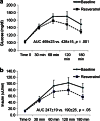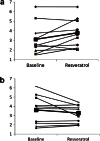Pilot study of resveratrol in older adults with impaired glucose tolerance - PubMed (original) (raw)
Randomized Controlled Trial
. 2012 Dec;67(12):1307-12.
doi: 10.1093/gerona/glr235. Epub 2012 Jan 4.
Affiliations
- PMID: 22219517
- PMCID: PMC3670158
- DOI: 10.1093/gerona/glr235
Randomized Controlled Trial
Pilot study of resveratrol in older adults with impaired glucose tolerance
Jill P Crandall et al. J Gerontol A Biol Sci Med Sci. 2012 Dec.
Abstract
Background: Resveratrol, a plant-derived polyphenol, has shown promising effects on insulin sensitivity and glucose tolerance in animal models and is also reported to have cardioprotective properties, but human studies are limited. In a pilot study, we tested the hypothesis that resveratrol improves glucose metabolism and vascular function in older adults with impaired glucose tolerance (IGT).
Methods: Ten subjects aged 72 ± 3 years (M ± SD) with IGT were enrolled in a 4-week open-label study of resveratrol (daily dose 1, 1.5, or 2 g). Following a standard mixed meal (110 g carbohydrate, 20 g protein, 20 g fat), we measured 3-hour glucose and insulin area under the curve (AUC), insulin sensitivity (Matsuda index), and secretion (corrected insulin response at 30 minutes). Endothelial function was assessed by reactive hyperemia peripheral arterial tonometry (reactive hyperemia index) before and 90 minutes postmeal. Results did not differ by dose, so data were combined for analysis.
Results: At baseline, body mass index was 29 ± 5 kg/m(2), fasting plasma glucose 110 ± 13 mg/dL, and 2-hour glucose 183 ± 33 mg/dL. After 4 weeks of resveratrol, fasting plasma glucose was unchanged, but peak postmeal (185 ± 10 vs 166 ± 9 mg/dL, p = .003) and 3-hour glucose AUC (469 ± 23 vs 428 ± 19, p = .001) declined. Matsuda index improved (3.1 ± 0.5 vs 3.8 ± 0.5, p = .03), and corrected insulin response at 30 minutes was unchanged (0.6 ± 0.1 vs 0.5 ± 0.5, p = .49). There was a trend toward improved postmeal reactive hyperemia index (baseline vs resveratrol postmeal delta -0.4 ± 0.2 vs 0.2 ± 0.3, p = .06). Weight, blood pressure, and lipids were unchanged.
Conclusions: At doses between 1 and 2 g/day, resveratrol improves insulin sensitivity and postmeal plasma glucose in subjects with IGT. These preliminary findings support the conduct of larger studies to further investigate the effects of resveratrol on metabolism and vascular function.
Figures
Figure 1.
Glucose and insulin profiles at baseline and after 4 weeks treatment with resveratrol. Glucose and insulin levels obtained fasting and 30, 60,120 and 180 minutes following meal challenge; area under the curve (AUC) calculated using trapezoidal method.
Figure 2.
Insulin sensitivity at baseline and after 4 weeks treatment with resveratrol. (a) Insulin sensitivity estimated by Matsuda index, using glucose and insulin levels at 30, 60, 120 and 180 minutes following meal challenge. Baseline vs. resveratrol, p = .03. (b) Insulin sensitivity estimated by HOMA-IR, using fasting glucose and insulin levels. Baseline vs. resveratrol, p = .13. Improved insulin sensitivity is indicated by an increase in Matsuda index and a decrease in HOMA-IR.
Figure 3.
Reactive-hyperemia index (RHI) at baseline and after 4 weeks treatment with resveratrol. (a) RHI at study baseline. (b) RHI after 4 weeks treatment with resveratrol. RH-PAT performed fasting and 90 minutes post meal challenge; RHI is ratio of post-hyperemia pulse amplitude divided by baseline amplitude (see Methods for details). Baseline vs. resveratrol post-meal delta, _p_= .06.
Similar articles
- Resveratrol Improves Vascular Function and Mitochondrial Number but Not Glucose Metabolism in Older Adults.
Pollack RM, Barzilai N, Anghel V, Kulkarni AS, Golden A, O'Broin P, Sinclair DA, Bonkowski MS, Coleville AJ, Powell D, Kim S, Moaddel R, Stein D, Zhang K, Hawkins M, Crandall JP. Pollack RM, et al. J Gerontol A Biol Sci Med Sci. 2017 Nov 9;72(12):1703-1709. doi: 10.1093/gerona/glx041. J Gerontol A Biol Sci Med Sci. 2017. PMID: 28329397 Free PMC article. Clinical Trial. - Impact of glucagon response on postprandial hyperglycemia in men with impaired glucose tolerance and type 2 diabetes mellitus.
Henkel E, Menschikowski M, Koehler C, Leonhardt W, Hanefeld M. Henkel E, et al. Metabolism. 2005 Sep;54(9):1168-73. doi: 10.1016/j.metabol.2005.03.024. Metabolism. 2005. PMID: 16125528 - Differences in insulin action and secretion, plasma lipids and blood pressure levels between impaired fasting glucose and impaired glucose tolerance in Japanese subjects.
Miyazaki Y, Akasaka H, Ohnishi H, Saitoh S, DeFronzo RA, Shimamoto K. Miyazaki Y, et al. Hypertens Res. 2008 Jul;31(7):1357-63. doi: 10.1291/hypres.31.1357. Hypertens Res. 2008. PMID: 18957806 - Impaired early- but not late-phase insulin secretion in subjects with impaired fasting glucose.
Kanat M, Norton L, Winnier D, Jenkinson C, DeFronzo RA, Abdul-Ghani MA. Kanat M, et al. Acta Diabetol. 2011 Sep;48(3):209-17. doi: 10.1007/s00592-011-0285-x. Epub 2011 May 8. Acta Diabetol. 2011. PMID: 21553243 Clinical Trial. - L-arginine enriched biscuits improve endothelial function and glucose metabolism: a pilot study in healthy subjects and a cross-over study in subjects with impaired glucose tolerance and metabolic syndrome.
Monti LD, Casiraghi MC, Setola E, Galluccio E, Pagani MA, Quaglia L, Bosi E, Piatti P. Monti LD, et al. Metabolism. 2013 Feb;62(2):255-64. doi: 10.1016/j.metabol.2012.08.004. Epub 2012 Oct 3. Metabolism. 2013. PMID: 23040413 Clinical Trial.
Cited by
- Natural Products as Modulators of Sirtuins.
Karaman Mayack B, Sippl W, Ntie-Kang F. Karaman Mayack B, et al. Molecules. 2020 Jul 20;25(14):3287. doi: 10.3390/molecules25143287. Molecules. 2020. PMID: 32698385 Free PMC article. Review. - Slowing ageing by design: the rise of NAD+ and sirtuin-activating compounds.
Bonkowski MS, Sinclair DA. Bonkowski MS, et al. Nat Rev Mol Cell Biol. 2016 Nov;17(11):679-690. doi: 10.1038/nrm.2016.93. Epub 2016 Aug 24. Nat Rev Mol Cell Biol. 2016. PMID: 27552971 Free PMC article. Review. - Resveratrol and clinical trials: the crossroad from in vitro studies to human evidence.
Tomé-Carneiro J, Larrosa M, González-Sarrías A, Tomás-Barberán FA, García-Conesa MT, Espín JC. Tomé-Carneiro J, et al. Curr Pharm Des. 2013;19(34):6064-93. doi: 10.2174/13816128113199990407. Curr Pharm Des. 2013. PMID: 23448440 Free PMC article. Review. - Skeletal muscle SIRT1 and the genetics of metabolic health: therapeutic activation by pharmaceuticals and exercise.
Williams CB, Gurd BJ. Williams CB, et al. Appl Clin Genet. 2012 Aug 29;5:81-91. doi: 10.2147/TACG.S31276. Print 2012. Appl Clin Genet. 2012. PMID: 23776383 Free PMC article.
References
- Baur JA, Sinclair DA. Therapeutic potential of resveratrol: the in vivo evidence. Nat Rev Drug Discov. 2006;5:493–506. - PubMed
- Palsamy P, Subramanian S. Resveratrol, a natural phytoalexin, normalizes hyperglycemia in streptozotocin-nicotinamide induced experimental diabetic rats. Biomed Pharmacother. 2008;62:598–605. - PubMed
- Labbe A, Garand C, Cogger V, et al. Resveratrol improves insulin resistance, hyperglycemia and hepatosteatosis but not hypertriglyceridemia, inflammation and life span in a mouse model for Werner syndrome. J Gerontol A Biol Sci Med Sci. 2011;66:264–278. - PubMed
- Lagouge M, Argmann C, Gerhart-Hines Z, et al. Resveratrol improves mitochondrial function and protects against metabolic disease by activating SIRT1 and PGC-1alpha. Cell. 2006;127:1109–1122. - PubMed
Publication types
MeSH terms
Substances
LinkOut - more resources
Full Text Sources
Other Literature Sources
Medical


